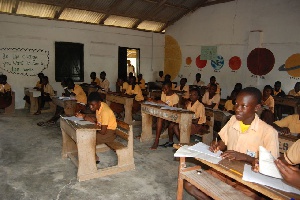There is high risk of corruption in the country’s basic education sector, which threatens to lower the standard of teaching and learning, research by Ghana Integrity Initiative (GII), an anticorruption agency, has found.
The risk factors identified include the payment of bribes by parents to gain favours for their children; illegal charging of fees by school authorities; selling of books meant for pupils; and teacher absenteeism.
Others include cumbersome bureaucratic processes that breed poor supervision; and ignorance on the part of community members and local institutions (Parent Teachers Association and School Management Committees). Most of these risks were more widespread in the northern sector of the country where, according to the GII research, it is affecting educational standards and preventing the rural poor from accessing education.
A Circuit Supervisor at the Berekum District, in the Brong Ahafo Region, Thomas Kyeremeh, said he faces serious challenges in performance of his duty as the supervisor of the various basic schools under the district.
According to him, the logistics needed to embark on proper supervision have not been provided by the Ghana Education Service (GES).
“We use our own means to visit the schools to validate the teachers and that is a cost to us, as far as validation of teachers is concern,” he said. The lack of logistics to these supervisors was condemned by participants at the launch of the GII documentary titled: “Our Future at Stake: Corruption Risk in The Education Sector”.
The school feeding programme also faces a serious challenge, according to the research; GII found that food cooked by the caterers were sometimes served without any protein-meat or fish- bringing the nutrition of the food into question.
Salamatu, a caterer under the School Feeding Programme in one of the schools covered by the GII research said the 80 pesewas per pupil is inadequate to provide a nutritious meal. “The figure we send to them, they always reduce it. They only pay 80 pesewas per child to us,” she said.
Public basic education is supposed to be free, and the government is expected each year to transfer a grant of GH¢4.5 (US$1.5) per child to the schools to meet their recurrent expenses. The reality, however, is very different.
The Public Relations Officer of the Ghana Education Service, Rev. Jonathan Bettey, noted that teacher absenteeism has been going down per data the Ministry has and that efforts will be doubled to further reduce the menace.
He said GES will strengthen monitoring in all the schools and anybody found guilty of these offences will be dealt with. Studies have confirmed a high rate of teacher absenteeism in the country’s schools, with teachers absent from their class at least once day in five days. The worse of it is that absenteeism is rampant in poor communities.
In areas with poverty rates above 60 percent, a teacher can be absent for two days in a week one study found. Children pay a high price for this level of absenteeism. At least 40 percent of pupils who write the national Basic Education Certificate Examination (BECE) do not attain the pass rate, while two out of three pupils leaving basic school are functionally illiterate.
Despite the obvious neglect of the schools by government, parents — believing in the notion that public basic school is free — don’t invest in their children’s education and offer no support to their schools, a head teacher told B&FT in an earlier interview. Mrs. Linda Ofori-Kwafo, Executive Director, GII, said the corruption risk in the education sector mostly affect the poor in the communities.
“We want GES to take measures to mitigate the corruption risk in basic education in the country. We want them to strengthen their supervision, implementation and sanction offenders.”
General News of Thursday, 2 February 2017
Source: 3news.com













